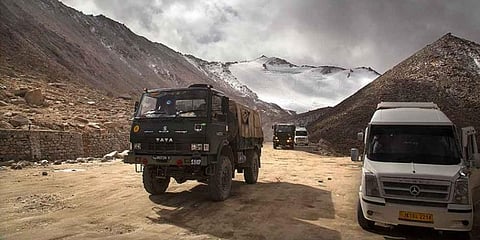

NEW DELHI: The Corps Commanders of India and China are scheduled to meet on Saturday for the 10th round of talks, indicating that the disengagement of troops from the northern and southern banks of the Pangong Tso is complete.
Confirming the development, a senior Army officer said, “The meeting is scheduled to be held in Moldo and is expected to start at 10 am.”
The ninth round of the meeting was also held in Moldo on January 24th. Moldo is on the Chinese side of the Line of Actual Control across the Indian Chushul sector in eastern Ladakh.
The Indian side will be led by Lt Gen PGK Menon, 14 Corps Commander and the Chinese side will be headed by Maj Gen Lin Liu, Commander of South Xinjian Military District.
Defence Minister Rajnath Singh had announced in the Parliament that the 10th round of talks was to be held within 48 hours of the disengagement being completed on the North and South banks of Pangong Tso. An agreement was reached between India and China as per which Chinese troops were to relocate to the east of Finger 8 and the Indian Army will be based at Dhan Singh Thapa post close to Finger 4 on the north bank of the lake.
The Indian Army had confirmed that both sides had moved back their armoured vehicles which were as close as 50 metres from each other at some places. Also, the two sides have brought down the fortifications and defences made during the stand-off.
As The New Indian Express reported, the Chinese People’s Liberation Army has moved back its artillery guns and brought down structures from the North Bank of the Pangong Tso.
The major announcement of an agreement on disengagement of the forces from standoff position at the Line of Actual Control in Eastern Ladakh came on February 11 as Defence Minister Rajnath Singh announced the development in the Rajya Sabha.
Indian and Chinese military began disengagement at Pangong on February 10 and it is being done in a “phased, coordinated and verified manner” restoring the situation that was before the commencement of standoff last year, Defence Minister Rajnath Singh had informed the Upper House.
Addressing the members, Singh had said that the Chinese side will keep their troop presence in the North Bank area to the east of Finger 8. Reciprocally, the Indian troops will be based at their permanent base at Dhan Singh Thapa Post near Finger
3.
Similar action would be taken in the South Bank area by both sides, he said. Landforms have to be restored to April 2020 position.
Talking about the details of the agreements with China, the Defence Minister said, “It has also been agreed to have a temporary moratorium on military activities by both sides in the North Bank, including patrolling to the traditional areas. Patrolling will be resumed only when both sides reach an agreement in diplomatic and military talks that would be held subsequently.”
The standoff remains at Depsang, Gogra, Hotspring, and in the Charding Ninglung Nallah (CNN) track junction in the Demchok sector.
The standoff in the Eastern Ladakh started in the first week of May month last year from Finger 4 as the Chinese and Indian troops had clashed. Subsequently, it had spread to several standoff points along the LAC in the North and South banks of the Pangong Tso.
Apart from the Finger Areas in the North Bank, Gogra-Hot Spring, Galwan, Depsang have been the other sites of standoff and Chushul Sector in the South Bank side of the Pangong lake.
On Thursday, China had said that the disengagement process of the PLA and Indian frontline troops at the eastern Ladakh border was progressing smoothly and expressed hope that both sides will make concerted efforts to achieve the goal.
Earlier on Friday morning, China, for the first time, admitted to casualties during the Galwan Valley clash with Indian troops. "Chen Hongjun, Chen Xiangrong, Xiao Siyuan and Wang Zhuoran died in a fierce struggle against foreign troops that violated an agreement and crossed into the Chinese side," a report in the CCP mouthpiece The Global Times said.